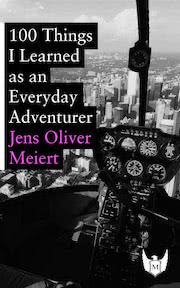The Choice to F Up
Published on March 6, 2021 (↻ February 5, 2024), filed under Philosophy and Everything Else (RSS feed for all categories).
I wrote this months ago, at heights of the pandemic and the Trump administration. The post feels a little strong at times, but I didn’t want to discard it. And I firmly believe in the conclusion: We choose. Everything.
You already know.
- People torture.
- People kill.
- People murder.
- People play with animals.
- People experiment with animals.
- People artificially inseminate animals.
- People industrially kill animals.
- People abstract food.
- People produce garbage.
- People abstract garbage.
- People pollute the environment.
- People destroy the environment.
- People are mindless.
- People distract themselves.
- People intoxicate themselves.
- People poison themselves.
- People hurt others.
- People don’t stand up when others are being hurt.
- People don’t respect human rights.
- (People don’t respect animal rights.)
- People don’t respect each other.
- People don’t care.
- People leave their children alone.
- People leave their elders alone.
- People insult each other.
- People neglect each other.
- People violate.
- People are speciesists.
- People are racists.
- People are ageists.
- People are sexists.
- People rape.
- People cheat.
- People exploit.
- People lie.
- People steal.
- People compete.
- People are dishonest.
- People are extreme.
- People are fanatic.
- People are harsh.
- People are brutal.
- People do terrible things.
- People allow others to do terrible things.
- People allow others to get away with doing terrible things.
- People are unfair.
- People are unjust.
- People put profit over values.
- People have no values.
- People have no idea.
- People lie to themselves.
- People pretend they have nothing to do with anything.
- People pretend they have no power.
- People don’t take action.
That’s a fraction of what mankind, of what people, of what you and I are doing and not doing, what you and I are allowing ourselves and others to do and not to do.
That’s a fraction of how we fuck up, and how we fuck up literally everything.
I’m not going to attribute and reference this all. If you know about or agree with just three of these generalizations to be a problem we probably already look at trouble. (If you don’t, nothing may convince you anyway—philosophy IRL?)
Choice
While you can question or discount what’s in the list above, you can certainly also add a good number of other things we f up.
Yet here’s the thing, here’s an idea:
We f up so much that it’s actually ridiculous to think that we had a serious interest in having it another way, in changing it, in choosing differently.
In fact, I think it’s rather getting clear that we, collectively, do not have a particular interest in changing much of this—because if we did, we would change it.
So what is really going on, how could we possibly look at all of this?
Here I’m going to be lazy (possibly too lazy). The answer must be a philosophical one (because philosophy is the only science concerned with what this, what reality actually is).
It’s a mix of the following:
-
The idea that this life is not “it.” (Cf. The 1,000 Lives Thought Experiment.)
-
The idea that we are, indeed, free, notably in a sense that we are free to choose. (I believe a proof for freedom is actually quite easy to produce, but as I’ve been wrong about judging my respective abilities in the past, as I’m not in academics anymore, and as my former professor, Birgit Recki, likely following in Kant’s footsteps, has written quite a nice book about freedom, Freiheit, I’ll keep it there.)
-
The idea that we have no, and literally no, sufficient model and idea for what life and reality actually are. (I have nothing to defend against this one at the moment, either, other than in turn doubting, questioning, and rejecting any popular model that folklore, religion, or the whole of all sciences have so far promoted. No model with any widespread recognition seems to be a good model for our reality, which means most or all of us are rather clueless what this is here.)
Is this all BS, now? Isn’t all I’m saying that “in my opinion, we choose to f everything up”? As a baseline, yes! I think that’s a good way of putting it. Yet don’t miss the point: We choose to f up.
Solace
As long as we keep choosing this—no matter whether you require approval by the academic world that we can make choices, or not—there will be no change.
Only when we, many or most of us, choose not to f everything up anymore, will there be actual change and progress.
Either way, however, it’s okay (and this is hard now): We’ve chosen this. We’ve wanted this. If this is who we are, people who torture, kill, domineer, pollute, neglect, disrespect, cheat, lie, compete, et cetera perge, perge, then this is who we choose to be and then everything must and must keep going to “hell.”
And then it must be okay. Whether you believe this is the only life you live, or one of many, it must be okay because we’ve chosen so. That’s really the strange beauty of all the f’ed up s around us: We chose to f it all up. We chose this experience.
Yet: We can also choose differently. Maybe we will. Maybe we could start. You, and I. All of us. Let’s choose, differently. Let’s choose healthier, more constructively, for ourselves and for all of us.
About Me

I’m Jens (long: Jens Oliver Meiert), and I’m a frontend engineering leader and tech author/publisher. I’ve worked as a technical lead for companies like Google and as an engineering manager for companies like Miro, I’m close to W3C and WHATWG, and I write and review books for O’Reilly and Frontend Dogma.
I love trying things, not only in web development (and engineering management), but also in other areas like philosophy. Here on meiert.com I share some of my views and experiences.
If you’d like to do me a favor, interpret charitably (I speak three languages, and they do collide), yet be critical and give feedback for me to fix issues, learn, and improve. Thank you!
Read More
Maybe of interest to you, too:
- Next: Code in Quarantine
- Previous: 33 Additional Web Development Terms You May Not Have Heard Of
- More under Philosophy or Everything Else
- More from 2021
- Most popular posts
Looking for a way to comment? Comments have been disabled, unfortunately.

Find adventure anywhere? Try 100 Things I Learned as an Everyday Adventurer (2013). During my time in the States I started trying everything. Everything. Then I noticed that wasn’t only fun, it was also useful. Available at Amazon, Apple Books, Kobo, Google Play Books, and Leanpub.

